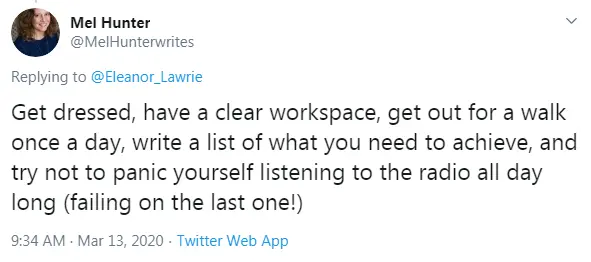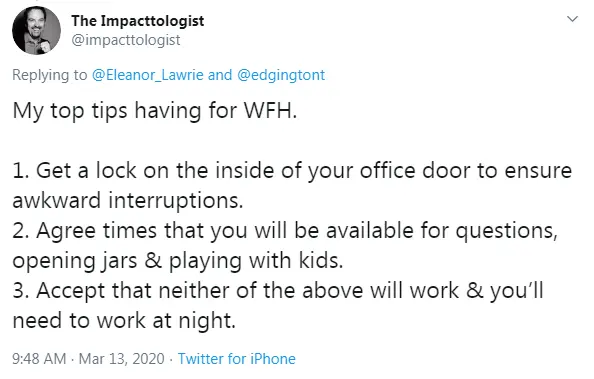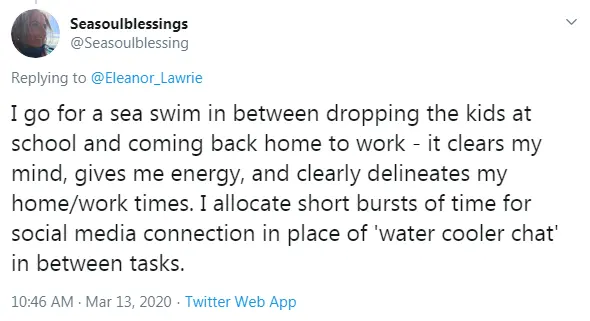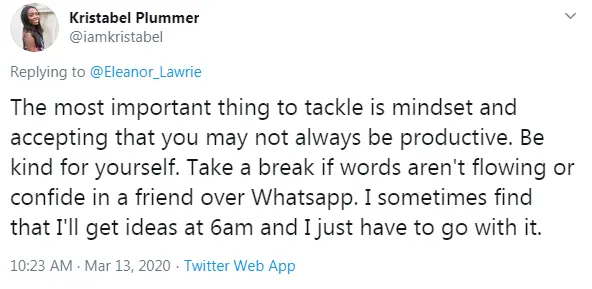Coronavirus: Five ways to work well from home
 Getty Images
Getty ImagesThousands of people are likely to be working from home for the first time this week due to the coronavirus outbreak. For others, it's just like any other week.
About 1.5 million people work from home, and it's becoming more popular all the time.
So if you're not self-isolating, but have been told to work remotely, what's the best way to stay efficient and keep your spirits up?
1. Get dressed
For some people, the prospect of staying in their pyjamas all day is the most tantalising aspect of working from home. But washing and getting dressed will not only improve your state of mind, it will psychologically prepare you to start work.
Whether you need to change into business attire depends on the type of person you are and the nature of the job you have. Some people find that dressing formally is helpful, and also useful if they need to dial into a video call.
 Twitter
Twitter But for many others, the point of getting dressed is being forced to shower and change out of clothes they associate with sleep and rest, even if that means just changing into a T-shirt and jeans.
Wearing respectable clothes also increases motivation to leave the house. Likewise, changing out of work clothes when you clock off for the day helps your brain to understand that the working day is over.
2. Establish boundaries
If you're employed by a company, you'll probably have set hours of work, and it's important to stick to these when you're working from home. Be ready to start your day at the same time as you would normally arrive in your office or workplace, and finish your day at the same time.
Em Sheldon, a blogger and freelance writer, says she sticks to a routine while working from home. She advises "going to bed at a reasonable hour so that you get enough sleep and then wake up at your usual time.
 Getty Images
Getty Images"I also find things like booking in a workout or getting my gym kit ready means I have to get up and go," she says. "Once you do something over and over, it becomes a habit, so the first week may be challenging but eventually it becomes part of your routine."
At the end of a working day, it's best to switch off your computer and tidy away papers and other items. Space allowing, set aside a specific, separate area in your home where you can set yourself up - ideally with a properly adjusted desk and chair, similar to your workplace.
The NHS advice is that you should adjust your chair so you can use the keyboard with your wrists and forearms straight and level with the floor.
 Twitter
Twitter If there are other people in the house, finding a space where you're not likely to be disturbed is essential, as Prof Robert Kelly found out the hard way in 2017. He was being interviewed live by BBC News when his two children burst into the room, creating a now infamous video, which has been viewed more than 30 million times.
It's also important to not "overcompensate" because you're anxious about working from home, says Ross Robinson, who manages a team of freelancers at his Ignata Consulting firm.
"Many people tend to over communicate when working from home - either wanting to 'be seen', or overcompensating to ensure people know what they are up to. That's fine - but don't go over the top. You know if you're on task and being productive - keep yourself in check."
3. Get out and about (if you're not self-isolating)
Working from home shouldn't mean you stay cooped up indoors all day. While you might not miss your daily commute, it does guarantee that you leave the house at least once during the day.
So get your shoes on, get outside and enjoy that fresh air. A different perspective will also help undo mental blocks and give you a fresh pair of eyes for any tasks you're struggling with.
 Getty Images
Getty ImagesMatthew Knight, founder of Leapers, a group that supports self-employed people and freelancers, says getting outside first thing helps him feel like it's time to work.
"There's a mental angle for each individual that makes you feel like you're working," he says. "I will leave the house and walk around the block and feel like right now I am at work. Find ways of putting in those boundaries otherwise it becomes difficult to switch off."
If you can't go outside, you could even bring the atmosphere of the office to you.
"I like bustle and being around people, so I use sound to help make a bit of an atmosphere," says Gillian Roche-Saunders, whose entire regulatory consultancy firm Adempi Associates work remotely.
She uses an app that plays background sounds such as a train moving along tracks, or the chatter of a coffee shop.
4. Pick up the phone
If you're working from home, the chances are you'll be alone, so you won't get distracted by colleagues' conversations and other office noise.
When you're at work, you're more likely to engage with colleagues but when you're working from home, you could spend the whole day without speaking to anyone which can be isolating.
 Getty Images
Getty ImagesMake some time to pick up the phone and have a real conversation, rather than relying on email and instant messaging.
"More and more people hide behind email rather than pick up the phone and talk to colleagues and contacts," says Hugo Mortimer-Harvey, who's worked remotely from Spain as a freelance PR consultant since 2018.
"When you spend the day working on your own, actually calling people and having a conversation can be much more stimulating and indeed productive than a chain of emails."
 Twitter
TwitterJack Evans is lead business psychologist at workplace wellness consultancy Robertson Cooper, which is planning to have all its staff temporarily work from home. Their plan is to speak to each other for 30 minutes every day via video conferencing.
"At about lunchtime we will just chat over video message about nothing in particular. It's to make sure people don't just turn into work monkeys. We will maintain conversation about work but it's also about not losing that social connection, which is much easier to get in person."
5. Take regular breaks
It's good to have a routine when you're working from home, but work shouldn't become monotonous.
And you shouldn't stay glued to your screen all day. It's important to take regular screen breaks and get up from your desk and move around just as you would in an office.
 Getty Images
Getty ImagesResearch has also found that short breaks throughout the day are more beneficial than less frequent, longer breaks.
Many home workers recommend the Pomodoro Technique, a method of time management which breaks your working day into 25 minute chunks. Each chunk is followed by a five minute break.
 Twitter
Twitter Ellie Wilson is co-founder of virtual assistant service, Virtalent, and has a team of more than 50 remote workers.
"It's important to stand up, stretch, move around and even go for a short walk to take a break from your work and your screen," she says.
"Being cooped up without stopping for a break can mean your productivity levels drop, you become more tired and less motivated to complete what you're working on."
